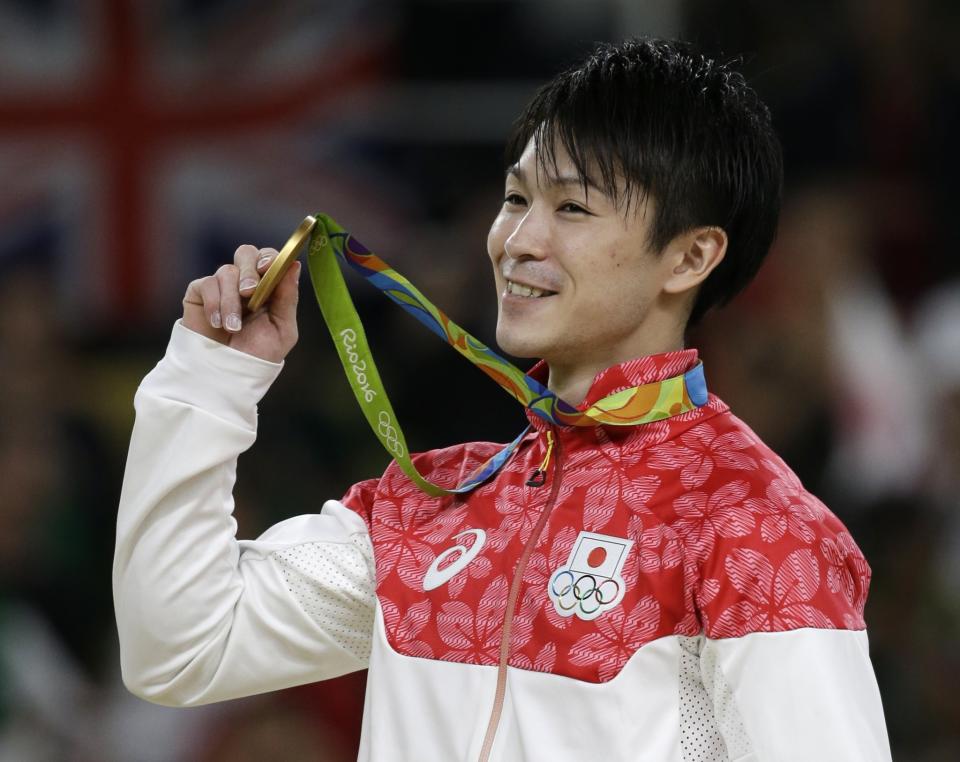Controversy arises after Phelps of gymnastics wins men's all-around gold
RIO DE JANEIRO — There was a moment of tension, a moment of shock, a moment of controversy and then a moment of awkwardness.
Finally, there was a moment of respect.
Kohei Uchimura, arguably the greatest men’s gymnast ever, needed a near-pristine high-bar routine to have a chance at becoming the first to defend an Olympic all-around championship in more than 40 years.
He was pushed to the edge by Ukraine’s Oleg Verniaiev, who was the only one in the competition to score more than a 16 on any one apparatus on Wednesday – a 16.100 on parallel bars. It came down to the last few minutes, with Uchimura jumping up and grabbing the bar and everyone in the arena knowing one error would keep him from history.
His routine was a work of art, earning Uchimura a score of 15.800, but Verniaiev still had a clear shot at gold. Even after a slight step on his dismount, he pumped a fist and drew cheers. It looked as if he had pulled the upset, and everyone inside Rio Olympic Arena watched the scoreboard.
Then, the number: 14.800. He was a tenth of a point short. Silver for Verniaiev.
The crowd gasped and groaned. Verniaiev hunched his shoulders in querulousness. Did a single half-step change gymnastics history? Was the score fair? Was this judging malfeasance in a sport known for it?
The drama lifted again in the press conference, as one reporter stood to ask Uchimura if the judges had made their marks simply out of personal favoritism.
The Japanese star listened to the translation through his headphones, tilted his head and asked the man to repeat his question. The other reporters laughed nervously.

“Your performance in the last event was very impressive,” the reporter said. “But you won by one tenth of a point. Don’t you have any doubt that this difference is too much? Don’t you feel you have sympathy from referees?”
It was an accusation draped in a question: Did the judges choose you because of your reputation?
“Have I been shown favor?” Uchimura replied, again through a translator. “Absolutely no. It would never happen.”
“There’s no such thing as judges liking a certain athlete or not,” he went on. “We just do our best as we are trying to achieve. We’re all human beings, we all have feelings. But they are professionals; there’s no room for personal feelings to come into that judgment.”
Now it was up to Verniaiev to respond. He could have raised hell. He could have made the case that he was robbed of the gold, and it could have been a credible case.
He didn’t go there.
“We all have feelings,” he said, “but we know the scores are fair. All the questions are superfluous here.”
[Related: Simone Biles “Brazilian” boyfriend enjoys spotlight]
It was a classy gesture by a defeated man, and it seemed a sincere one. He steered further away from the controversy and then added a layer of praise.
“Kohei in gymnastics is like Phelps in swimming,” he said. “We have our own Phelps.”
At that, the Japanese media applauded.
It was a bit of a strange scene: the pressing question, the applause and there was even a Ukrainian reporter who stood up to say Verniaiev was “our champion.”
In the end, though, few will remember what came after the athletes left the podium. Uchimura’s history is what everyone will remember.
“When it comes to the quantity of medals,” Verniaiev said, “he is a legend, he was already a legend.”
That much is beyond argument.

 Yahoo Sports
Yahoo Sports 

